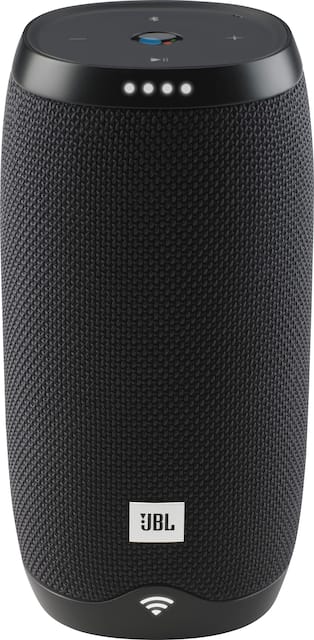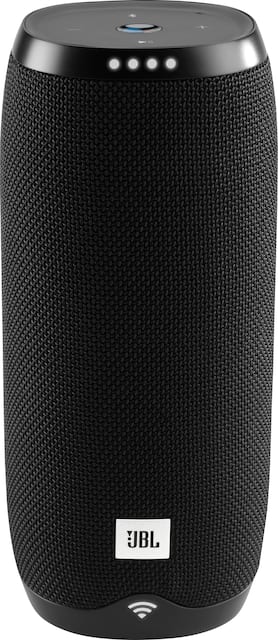| TL;DR The JBL LINK 10 and LINK 20 should have been amazing products. Unfortunately, all three units purchased from two different Best Buy stores have the same major audio problem. The audio cracks and pops even at medium volume of the most delicate content. I cannot get through Clair de Lune (at medium volume) or even streaming of voice content from NPR without very noticeable popping at random instants – the kind of popping you might expect if you had a loose connection within a speaker amplifier that generates discontinuous movements of a speaker every time it vibrates loose for a moment. We have returned all three speakers. I do not recommend you waste your time or money with these things. |
I was originally very excited by the announcement of the JBL LINK Series, with the JBL LINK 10 (below, left) and the JBL LINK 20 (below, right) models being particularly interesting to me.
In short, both speakers are like portable versions of the traditional Google Home with the promise of potentially better audio quality because they are made by speaker companies. There have been several 3rd-party Bluetooth speakers with Amazon Alexa integration, but they are more similar to the Echo Tap than the full Echo because they required pressing a button to call up Alexa. Instead, members of the JBL LINK series are fully voice activated just like Google Home, and the LINK 10 promises a 5-hour battery life when unplugged and the LINK 20 promises a 10-hour battery life when unplugged. Furthermore, both the LINK 10 and LINK 20 have an IPX7 waterproof design which means you can not only take them outside but you can put them in the shower. My wife and I have been looking for an elegant way to extend our voice assistants and multi-room audio systems outside, and this new line of speakers seemed perfect for that. Plus, when we brought them inside, they could serve as full-featured voice-activated Google Home replacements (albeit without the beta features that we get early on our real Google Homes).
On the day the JBL LINK 20 was released, we purchased a $199 JBL LINK 20 from a local Best Buy. Setting it up was identical to setting up a Google Home. The unit came with a JBL's characteristic orange 10W USB charger and micro-USB cable; however, the unit had plenty of charge and could be used off the charger out of the box. Once I set it up, I asked Google Assistant to stream from our local NPR station. I was surprised to hear subtle but very noticeable popping at random times during the stream. I thought this could be a problem with the stream (although I did not notice these popping noises when I streamed on true Google Home or Amazon Echo devices in our home), and so I played a nice song called "Tennessee Whiskey" by Chris Stapleton, and I noticed the same problem. Finally, I played the gentle, all-piano "Clair de Lune" by Claude Debussy at medium volume (2 or 3 dots on the front of the unit) and heard the same random popping. The popping is unrelated to whether the speaker is plugged into the charger or not; it is consistent in all operating conditions.
Being an optimist, I assumed I must have received a dud. Trying to minimize the chances of getting another from a batch of duds, I returned the unit back to a different Best Buy and purchased BOTH a $149 JBL LINK 10 and a brand new $199 JBL LINK 20 to try them out. I was surprised to find out that the $50 difference between the two not only paid for the larger speaker and battery but also paid for the USB charger! Although the LINK 20 comes with a 10W charger, the LINK 10 only comes with the cable. Regardless of that, they BOTH had the exact same problem as the first LINK 20 we purchased – they couldn't pass the "Clair de Lune" test at medium volume! So I have to conclude that there is something fundamentally wrong with the JBL LINK series (at least in the LINK 10 and LINK 20 varieties).
I'm extremely disappointed by this result. It makes me think that the sale of Harman (and JBL) to Samsung earlier this year is starting to take its toll on product quality. I guess I should be happy the device didn't explode in my hands. Still, I'm sad it doesn't provide the awesome sound quality of the much older JBL products I own. Even the $80 JBL FLIP 4's that I have clearly out-perform these much more expensive LINK 10 and LINK 20's. I was thinking about pairing the new Google Home Mini with a JBL FLIP 4, but I just learned that the Google Home Mini has no 3.5mm audio jack and only has Bluetooth support as a target speaker and not as a source (so you are stuck with the Mini's apparently crappy speaker). If only the Chromecast Audio could directly connect to a Bluetooth speaker (without some ugly dongle), then at least I'd have a path toward an elegant solution to outdoor casting. Meanwhile, back to the drawing board!


